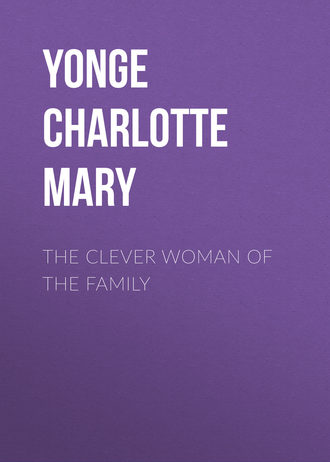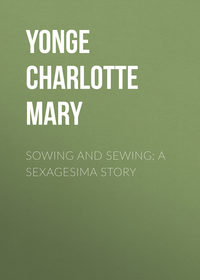 полная версия
полная версияПолная версия
The Clever Woman of the Family
“Oh, Conrade, Conrade!” cried Fanny, quite confounded, “You can’t have done like this!”
“So, I have not,” said Conrade, coming up to her, as she held out her hand, positively encouraging him, as Rachel thought, to persist in the untruth.
“Listen, Fanny,” said Rachel. “I do not wonder that you are unwilling to believe anything so shocking, but I do not come without being only too certain.” And she gave the facts, to which Fanny listened with pale cheeks and tearful eyes, then turned to the boy, whose hand she had held all the time, and said, “Dear Con, do pray tell me if you did it.”
“I did not,” said Conrade, wrenching his hand away, and putting it behind his back.
“Where’s Hubert?” asked Rachel, looking round, and much vexed when she perceived that Hubert had been within hearing all the time, though to be sure there was some little hope to be founded upon the simplicity of five years old.
“Come here, Hubert dear,” said his mother; “don’t be frightened, only come and tell me where you and Con went yesterday, when the others were playing at bowls.” Hubert hung his head, and looked at his brother.
“Tell,” quoth Conrade. “Never mind her, she’s only a civilian.”
“Where did you go, Hubert?”
“Con showed me the little birds in their nest.”
“That is right, Hubert, good little boy. Did you or he touch the nest?”
“Yes.” Then, as Conrade started, and looked fiercely at him, “Yes you did, Con, you touched the inside to see what it was made of.”
“But what did you do with it?” asked Rachel.
“Left it there, up in the tree,” said the little boy.
“There, Rachel!” said the mother, triumphantly.
“I don’t know what you mean,” said Rachel, angrily, “only that Conrade is a worse boy than I had thought him, end has been teaching his little brother falsehood.”
The angry voice set Hubert crying, and little Cyril, who was very soft-hearted, joined in chorus, followed by the baby, who was conscious of something very disagreeable going on in her nursery. Thereupon, after the apparently most important business of comforting Miss Temple had been gone through, the court of justice adjourned, Rachel opening the door of Conrade’s little room, and recommending solitary imprisonment there till he should be brought to confession. She did not at all reckon on his mother going in with him, and shutting the door after her. It was not the popular notion of solitary confinement, and Rachel was obliged to retire, and wait in the drawing-room for a quarter of an hour before Fanny came down, and then it was to say—
“Do you know, Rachel dear, I am convinced that it must be a mistake. Conrade assures me he never touched the nest.”
“So he persists in it?”
“And indeed, Rachel dear, I cannot help believing him. If it had been Francie, now; but I never knew Conrade tell an untruth in his life.”
“You never knew, because you always believe him.”
“And it is not only me, but I have often heard the Major say he could always depend on Conrade’s word.”
Rachel’s next endeavour was at gentle argument. “It must be dreadful to make such a discovery, but it was far worse to let deceit go on undetected; and if only they were firm—” At that moment she beheld two knickerbocker boys prancing on the lawn.
“Didn’t you lock the door? Has he broken out? How audacious!”
“I let him come out,” said Fanny; “there was nothing to shut him up for. I beg your pardon, dear Rachel; I am very sony for the poor little birds and for Grace, but I am sure Conrade did not take it.”
“How can you be so unreasonable, Fanny—the evidence,” and Rachel went over it all again.
“Don’t you think,” said Fanny, “that some boy may have got into the park?”
“My dear Fanny, I am sorry for you, it is quite out of the question to think so; the place is not a stone’s-throw from Randall’s lodge. It will be the most fatal thing in the world to let your weakness be imposed on in this way. Now that the case is clear, the boy must be forced to confession, and severely punished.”
Fanny burst into tears.
“I am very sorry for you, Fanny. I know it is very painful; I assure you it is so to me. Perhaps it would be best if I were to lock him up, and go from time to time to see if he is come to a better mind.”
She rose up.
“No, no, Rachel!” absolutely screamed Fanny, starting up, “my boy hasn’t done anything wrong, and I won’t have him locked up! Go away! If anything is to be done to my boys, I’ll do it myself: they haven’t got any one but me. Oh, I wish the Major would come!”
“Fanny, how can you be so foolish?—as if I would hurt your boys!”
“But you won’t believe Conrade—my Conrade, that never told a falsehood in his life!” cried the mother, with a flush in her cheeks and a bright glance in her soft eyes. “You want me to punish him for what he hasn’t done.”
“How much alike mothers are in all classes of life,” thought Rachel, and much in the way in which she would have brought Zack’s mother to reason by threats of expulsion from the shoe-club, she observed, “Well Fanny, one thing is clear, while you are so weak as to let that boy go on in his deceit, unrepentant and unpunished, I can have no more to do with his education.”
“Indeed,” softly said Fanny, “I am afraid so, Rachel. You have taken a great deal of trouble, but Conrade declares he will never say a lesson to you again, and I don’t quite see how to make him after this.”
“Oh, very well; then there’s an end of it. I am sorry for you, Fanny.”
And away walked Rachel, and as she went towards the gate two artificial jets d’eau, making a considerable curve in the air, alighted, the one just before her, the other, better aimed, in the back of her neck. She had too much dignity to charge back upon the offenders, but she went home full of the story of Fanny’s lamentable weakness, and prognostications of the misery she was entailing on herself. Her mother and sister were both much concerned, and thought Fanny extremely foolish; Mrs. Curtis consoling herself with the hope that the boys would be cured and tamed at school, and begging that they might never be let loose in the park again. Rachel could not dwell much longer on the matter, for she had to ride to Upper Avon Park to hold council on the books to be ordered for the book-club; for if she did got go herself, whatever she wanted especially was always set aside as too something or other for the rest of the subscribers.
Mrs. Curtis was tired, and stayed at home; and Grace spent the afternoon in investigations about the harrying of the thrushes, but, alas! without coming a bit nearer the truth. Nothing was seen or heard of Lady Temple till, at half-past nine, one of the midges, or diminutive flies used at Avonmonth, came to the door, and Fanny came into the drawing-room—wan, tearful, agitated.
“Dear Rachel, I am so afraid I was hasty, I could not sleep without coming to tell you how sorry I am.”
“Then you are convinced? I knew you would be.”
“Oh, yes, I have just been sitting by him after he was gone to bed. He never goes to sleep till I have done that, and he always tells me if anything is on his mind. I could not ask him again, it would have been insulting him; but he went over it all of himself, and owned he ought not to have put a finger on the edge of the nest, but he wanted so to see what it was lined with; otherwise he never touched it. He says, poor boy, that it was only your being a civilian that made you not able to believe him, I am sure you must believe him now.”
Mrs. Curtis began, in her gentle way, about the difficulty of believing one’s children in fault, but Lady Temple was entirely past accepting the possibility of Conrade’s being to blame in this particular instance. It made her bristle up again, so that even Rachel saw the impossibility of pressing it, and trusted to some signal confutation to cure her of her infatuation. But she was as affectionate as ever, only wanting to be forgiven for the morning’s warmth, and to assure dear Aunt Curtis, dear Grace, and dearest Rachel in particular, that there was no doing without them, and it was the greatest blessing to be near them.
“Oh! and the squirting, dear Rachel! I was so sorry when I found it out, it was only Francie and Leo. I was very angry with them for it, and I should like to make them ask pardon, only I don’t think Francie would. I’m afraid they are very rude boys. I must write to the Major to find me a governess that won’t be very strict with them, and if she could be an officer’s daughter, the boys would respect her so much more.”
CHAPTER III. MACKAREL LANE
“For I would lonely stand Uplifting my white hand, On a mission, on a mission, To declare the coming vision.”ELIZABETH BARRETT BROWNING.“Well, Grace, all things considered, perhaps I had better walk down with you to Mackarel Lane, and then I can form a judgment on these Williamses without committing Fanny.”
“Then you do not intend to go on teaching?”
“Not while Conrade continues to brave me, and is backed up by poor Fanny.”
“I might speak to Miss Williams after church, and bring her in to Myrtlewood for Fanny to see.”
“Yes, that might do in time; but I shall make up my mind first. Poor Fanny is so easily led that we must take care what influences fall in her way.”
“I always wished you would call.”
“Yes, and I would not by way of patronage to please Mr. Touchett, but this is for a purpose; and I hope we shall find both sisters at home.”
Mackarel Lane was at right angles to the shore, running up the valley of the Avon; but it soon ceased to be fishy, and became agricultural, owning a few cottages of very humble gentility, which were wont to hang out boards to attract lodgers of small means. At one of these Grace rang, and obtained admittance to a parlour with crazy French windows opening on a little strip of garden. In a large wheeled chair, between the fire and the window, surrounded by numerous little appliances for comfort and occupation, sat the invalid Miss Williams, holding out her hand in welcome to the guests.
“A fine countenance! what one calls a fine countenance!” thought Rachel. “Is it a delusion of insipidity as usual? The brow is good, massive, too much for the features, but perhaps they were fuller once; eyes bright and vigorous, hazel, the colour for thought; complexion meant to be brilliant brunette, a pleasant glow still; hair with threads of grey. I hope she does not affect youth; she can’t be less than one or two and thirty! Many people set up for beauties with far less claim. What is the matter with her? It is not the countenance of deformity—accident, I should say. Yes, it is all favourable except the dress. What a material; what a pattern! Did she get it second-hand from a lady’s-maid? Will there be an incongruity in her conversation to match? Let us see. Grace making inquiries—Quite at my best—Ah! she is not one of the morbid sort, never thinking themselves better.”
“I was afraid, I had not seen you out for some time.”
“No; going out is a troublesome business, and sitting in the garden answers the same purpose.”
“Of air, perhaps, but hardly of change or of view.”
“Oh! I assure you there is a wonderful variety,” she answered, with an eager and brilliant smile.
“Clouds and sunsets?” asked Rachel, beginning to be interested.
“Yes, differing every day. Then I have the tamarisk and its inhabitants. There has been a tom-tit’s nest every year since we came, and that provides us with infinite amusement. Besides the sea-gulls are often so good as to float high enough for me to see them. There is a wonderful charm in a circumcribed view, because one is obliged to look well into it all.”
“Yes; eyes and no eyes apply there,” said Rachel.
“We found a great prize, too, the other day. Rosie!”
At the call a brown-haired, brown-eyed child of seven, looking like a little fawn, sprang to the window from the outside.
“My dear, will you show the sphynx to Miss Curtis?”
The little girl daintily brought a box covered with net, in which a huge apple-green caterpillar, with dashes of bright colour on his sides, and a horny spike on his tail, was feasting upon tamarisk leaves. Grace asked if she was going to keep it. “Yes, till it buries itself,” said the child. “Aunt Ermine thinks it is the elephant sphynx.”
“I cannot be sure,” said the aunt, “my sister tried to find a figure of it at Villars’, but he had no book that gave the caterpillars. Do you care for those creatures?”
“I like to watch them,” said Grace, “but I know nothing about them scientifically; Rachel does that.”
“Then can you help us to the history of our sphynx?” asked Miss Williams, with her pleasant look.
“I will see if I have his portrait,” said Rachel, “but I doubt it. I prefer general principles to details.”
“Don’t you find working out details the best way of entering into general principles?”
It was new to Rachel to find the mention of a general principle received neither with a stare nor a laugh; and she gathered herself up to answer, “Naming and collecting is not science.”
“And masonry is not architecture, but you can’t have architecture without it.”
“One can have broad ideas without all the petty work of flower botanists and butterfly naturalists.”
“Don’t you think the broad ideas would be rather of the hearsay order, at least to most people, unless their application were worked out in the trifle that came first to hand?”
“Experimental philosophy,” said Rachel, in rather a considering tone, as if the notion, when presented to her in plain English, required translation into the language of her thoughts.
“If you like to call it so,” said Miss Williams, with a look of arch fun. “For instance, the great art of mud pie taught us the porous nature of clay, the expansive power of steam, etc. etc.”
“You had some one to improve it to you?”
“Oh dear no. Only afterwards, when we read of such things we remembered how our clay manufactures always burst in the baking unless they were well dried first.”
“Then you had the rare power of elucidating a principle?”
“No, not I. My brother had; but I could only perceive the confirmation.”
“This reminds me of an interesting article on the Edgeworth system of education in the ‘Traveller’s Review.’ I will send it down to you.”
“Thank you, but I have it here.”
“Indeed; and do you not think it excellent, and quite agree with it?”
“Yes, I quite agree with it,” and there was an odd look in her bright transparent eyes that made Grace speculate whether she could have heard that agreement with the Invalid in the “Traveller’s Review” was one of the primary articles of faith acquired by Rachel.
But Grace, though rather proud of Rachel’s falling under the spell of Miss Williams’ conversation, deemed an examination rather hard on her, and took the opportunity of asking for her sister.
“She is generally at home by this time; but this is her last day at Cliff Cottages, and she was to stay late to help in the packing up.”
“Will she be at home for the present?” asked Grace.
“Yes, Rose and I are looking forward to a festival of her.”
Grace was not at all surprised to hear Rachel at once commit herself with “My cousin, Lady Temple,” and rush into the matter in hand as if secure that the other Miss Williams would educate on the principles of the Invalid; but full in the midst there was a sound of wheels and a ring at the bell. Miss Williams quietly signed to her little attendant to put a chair in an accessible place, and in walked Lady Temple, Mrs. Curtis, and the middle brace of boys.
“The room will be too full,” was Grace’s aside to her sister, chiefly thinking of her mother, but also of their hostess; but Rachel returned for answer, “I must see about it;” and Grace could only remove herself into the verandah, and try to attract Leoline and Hubert after her, but failing in this, she talked to the far more conversible Rose about the bullfinch that hung at the window, which loved no one but Aunt Ermine, and scolded and pecked at every one else; and Augustus, the beloved tame toad, that lived in a hole under a tree in the garden. Mrs. Curtis, considerate and tender-hearted, startled to find her daughter in the field, and wishing her niece to begin about her own affairs, talked common-place by way of filling up the time, and Rachel had her eyes free for a range of the apartment. The foundation was the dull, third-rate lodging-house, the superstructure told of other scenes. One end of the room was almost filled by the frameless portrait of a dignified clergyman, who would have had far more justice done to him by greater distance; a beautifully-painted miniature of a lady with short waist and small crisp curls, was the centre of a system of photographs over the mantel-piece; a large crayon sketch showed three sisters between the ages of six and sixteen, sentimentalizing over a flower-basket; a pair of water-colour drawings represented a handsome church and comfortable parsonage; and the domestic gallery was completed by two prints—one of a middle-aged county-member, the other one of Chalon’s ladylike matrons in watered-silk aprons. With some difficulty Rachel read on the one the autograph, J. T. Beauchamp, and on the other the inscription, the Lady Alison Beauchamp. The table-cover was of tasteful silk patchwork, the vase in the centre was of red earthenware, but was encircled with real ivy leaves gummed on in their freshness, and was filled with wild flowers; books filled every corner; and Rachel felt herself out of the much-loathed region of common-place, but she could not recover from her surprise at the audacity of such an independent measure on the part of her cousin; and under cover of her mother’s civil talk, said to Fanny, “I never expected to see you here.”
“My aunt thought of it,” said Fanny, “and as she seems to find the children too much—”
She broke off, for Mrs. Curtis had paused to let her introduce the subject, but poor Fanny had never taken the initiative, and Rachel did it for her by explaining that all had come on the same errand, to ask if Miss Williams would undertake the lessons of her nephews; Lady Temple softly murmured under her veil something about hopes and too much trouble; an appointment was made for the following morning, and Mrs. Curtis, with a general sensation of an oppressive multitude in a small room, took her leave, and the company departed, Fanny, all the way home, hoping that the other Miss Williams would be like her sister, pitying the cripple, wishing that the sisters were in the remotest degree military, so as to obtain the respect of the hoys, and wondering what would be the Major’s opinion.
“So many ladies!” exclaimed little Rose. “Aunt Ermine, have they made your head ache?”
“No, my dear, thank you, I am only tired. If you will pull out the rest for my feet, I will be quiet a little, and be ready for tea when Aunt Ailie comes.”
The child handily converted the chair into a couch, arranging the dress and coverings with the familiarity of long use, and by no means shocked by the contraction and helplessness of the lower limbs, to which she had been so much accustomed all her life that it never even occurred to her to pity Aunt Ermine, who never treated herself as an object of compassion. She was thanked by a tender pressure on her hair, and then saying—
“Now I shall wish Augustus good night; bring Violetta home from her play in the garden, and let her drink tea, and go to bed.”
Ah, Violetta, purchased with a silver groat, what was not your value in Mackarel Lane? Were you not one of its most considered inhabitants, scarcely less a child of Aunt Ermine and Aunt Alison than their Rosebud herself?
Murmur, murmur, rippled the child’s happy low-toned monologue directed to her silent but sufficient playmate, and so far from disturbing the aunt, that more than one smile played on her lips at the quaint fancies, and at the well of gladness in the young spirit, which made day after day of the society of a cripple and an old doll, one constant song of bliss, one dream of bright imaginings. Surely it was an equalization of blessings that rendered little lonely Rose, motherless and well nigh fatherless, poor, with no companion but a crippled aunt, a bird and a toad, with scarcely a toy, and never a party of pleasure, one of the most joyous beings under the sun, free from occasions of childish troubles, without collisions of temper, with few contradictions, and with lessons rather pleasure than toil. Perhaps Ermine did not take into account the sunshiny content and cheerfulness that made herself a delightful companion and playfellow, able to accept the child as her solace, not her burthen.
Presently Rose looked up, and meeting the bright pleasant eyes, observed—“Violetta has been very good, and said all her lessons quite perfect, and she would like to sit up till her Aunt Ailie comes home. Do you think she may?”
“Will she not be tired to-morrow?”
“Oh, then she will be lazy, and not get up when she is called, till I pull all the clothes off, and that will be fun.”
“Or she may be fretful now?”
A series of little squeaks ensued, followed by “Now, my love; that is taking a very unfair advantage of my promise. You will make your poor Aunt Ermine’s head ache, and I shall have to send you to bed.”
“Would not a story pass away the time?”
“You tell it, Aunt Ermine; your stories are always the best. And let there be a fairy in it!”
The fairy had nearly performed her part, when the arrival took place, and Rose darted forward to receive Aunt Ailie’s greeting kiss.
“Yes, Rosie—yes, Violetta; what do you think I have got for you?”
And out came a doll’s chair with a broken leg, condemned by the departing pupils, and granted with a laugh to the governess’s request to take it to her little niece; but never in its best days had the chair been so prized. It was introduced to Violetta as the reward of virtue for having controlled her fretfulness, and the repair of its infirmity was the first consideration that occupied all the three. After all, Violetta’s sitting posture was, as Alison observed, an example of the inclined plane, but that was nothing to Rose, and the seance would have been indefinitely prolonged, but for considerations for Violetta’s health.
The sisters were alike, and Alison had, like her elder, what is emphatically called countenance, but her features were less chiselled, and her dark straight brows so nearly met that, as Rose had once remarked, they made a bridge of one arch instead of two. Six years younger, in full health, and daily battling with the world, Alison had a remarkable look of concentration and vigour, her upright bearing, clear decided speech, and glance of kindness won instant respect and reliance, but her face missed the radiant beamy brightness of her sister’s; her face was sweet and winning, but it was not habitual with her, and there was about her a look as if some terrible wave of grief or suffering had swept over her ere yet the features were fully fixed, and had thus moulded her expression for life. But playfulness was the tone that reigned around Ermine’s couch at ordinary moments, and beside her the grave Alison was lively, not with effort, but by infection.
“There,” she said, holding up a cheque; “now we’ll have a jubilee, and take you down under the East cliff, and we’ll invest a shilling in ‘Ivanhoe,’ and Rose and Violetta shall open their ears!”
“And you shall have a respectable Sunday mantle.”
“Oh, I dare say Julia will send us a box.”
“Then you will have to put a label on your back, ‘Second-hand!’ or her velvet will be a scandal. I can’t wear out that at home like this flagrant, flowery thing, that I saw Miss Curtis looking at as rather a disreputable article. There’s preferment for you, Ailie! What do you think of a general’s widow with six boys? She is come after you. We had a great invasion—three Curtises and this pretty little widow, and various sons!”
“Will she stay?”
“Most likely, for she is a relation of Mrs. Curtis, and comes to be near her. You are to call for inspection at eleven o’clock tomorrow, so I fear your holiday will be short.”
“Well, the less play the less anxiety. How many drives will the six young gentlemen be worth to you?”
“I am afraid it will be at the cost of tough work to you; she looked to me too sweet a creature to have broken her sons in, but I should think she would be pleasant to deal with.”
“If she be like Miss Curtis, I am sure she will.”











